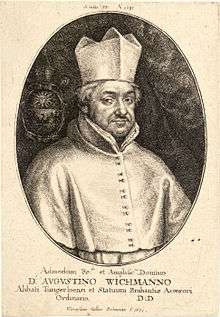Francis Wichmans

Francis Wichmans (name in religion Augustine) (born at Antwerp, 1596; died 1661) was a Belgian Norbertine abbot.
Life
Having finished his classical studies, he received the white habit in the Norbertine Abbey of Tongerloo, Belgium, 21 September 1612. Ordained priest 4 March 1620, he was sent to the University of Louvain, where he graduated as bachelor of theology.
Recalled to the abbey, he filled the offices of master of novices and circator. In 1630 he was made parish priest of Mierlo, and rural dean of Helmond. After the taking of 's-Hertogenbosch by the Dutch Protestants in 1629, Bishop Ophovius was obliged to leave his city, and resided at Geldrop, three miles from Mierlo. The bishop's Diarium shows that Ophovius conferred almost daily with Wichmans on the affairs of his diocese.
In 1632 Wichmans was transferred to the parish of Tilburg, in the same diocese, and was made rural dean of Hilvarenbeek. In 1634 the Retorsion laws were made, whereby Catholic priests were expelled, their churches confiscated and handed over to Protestant preachers. Wichmans then resided at Alphen, a village just outside the boundaries and six miles from Tilburg. From this place he administered his parish, always at the risk of his liberty and even his life.
In 1642 Wichmans was elected coadjutor to Abbot Verbraken, whose successor he became in 1644. He was also named a member of the Permanent Committee of the States of Brabant.
Wichmans promoted education in his abbey; in 1647 six of his religious graduated at Louvain, and a seventh in Rome. He erected or decorated several chapels in honour of the Blessed Virgin.
Works
He wrote several books, including "Sabbatismus Marianus", "Brabantia Mariana", and "Syntagma Sacerdotale".
References
- Attribution
 This article incorporates text from a publication now in the public domain: Herbermann, Charles, ed. (1913). "Francis Wichmans". Catholic Encyclopedia. New York: Robert Appleton. The entry cites:
This article incorporates text from a publication now in the public domain: Herbermann, Charles, ed. (1913). "Francis Wichmans". Catholic Encyclopedia. New York: Robert Appleton. The entry cites:
- VAN SPILBEECK, De Abdy van Tongerloo;
- TAYMANS, Lier, Catholiek Meyerysch Memorieboek (Hertzogenbusch, 1819).